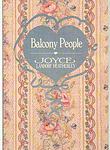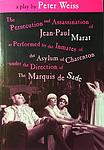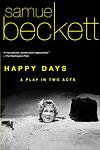The Greatest "Fiction, Drama, Existentialist" Books Since 1950
Click to learn how this list is calculated.
This list represents a comprehensive and trusted collection of the greatest books. Developed through a specialized algorithm, it brings together 300 'best of' book lists to form a definitive guide to the world's most acclaimed books. For those interested in how these books are chosen, additional details can be found on the rankings page.
Genres
Drama is a genre of literature that typically deals with serious and emotional themes, often exploring the complexities of human relationships and the struggles individuals face in their lives. These books often feature intense character development and intricate plotlines, delving into the depths of human experience and the challenges of navigating the world around us. From family dramas to political intrigue, the drama genre encompasses a wide range of stories that aim to captivate readers with their raw and powerful storytelling.
Existentialist literature is a genre that explores the meaning and purpose of human existence, often through the lens of individual experience and subjective perception. These books often delve into themes of freedom, choice, and responsibility, and may challenge traditional notions of morality and societal norms. Existentialist literature can be introspective and philosophical, and may offer readers a unique perspective on the human condition and the search for meaning in a complex and often chaotic world.
Countries
Date Range
Reading Statistics
Click the button below to see how many of these books you've read!
Download
If you're interested in downloading this list as a CSV file for use in a spreadsheet application, you can easily do so by clicking the button below. Please note that to ensure a manageable file size and faster download, the CSV will include details for only the first 500 books.
Download-
1. Waiting for Godot by Samuel Beckett
"Waiting for Godot" is a play that explores themes of existentialism, despair, and the human condition through the story of two characters, Vladimir and Estragon, who wait endlessly for a man named Godot, who never arrives. While they wait, they engage in a variety of discussions and encounter three other characters. The play is characterized by its minimalistic setting and lack of a traditional plot, leaving much to interpretation.
-
2. Endgame by Samuel Beckett
Endgame is a one-act play that follows the lives of Hamm, a blind and unable to stand man, and Clov, his servant who cannot sit. They live in a single room, with Hamm's legless parents residing in dustbins. The characters are trapped in a cyclical existence where they constantly argue and contemplate life, death, and their own existence. The play is characterized by its minimalistic setting and bleak outlook on life, reflecting themes of existentialism and the human condition.
-
3. Krapp's Last Tape by Samuel Beckett
"Krapp's Last Tape" is a one-act play about an aging man who annually records a review of the past year of his life. On his 69th birthday, he listens to a tape from 30 years earlier, where he reflects on his life at 39, his lost love, and his isolation. The play explores themes of memory, regret, and the passing of time, with the protagonist's relationship with his younger self revealing a portrait of a man in decline.
-
4. The Clay Machine-gun by Victor Pelevin
"The Clay Machine-gun" is a surreal and complex novel that explores the nature of reality and illusion. The story is set in post-Soviet Russia and follows a protagonist who has multiple identities, including a poet in 19th-century Russia, a 20th-century psychiatric patient, and a 21st-century advertising executive. The narrative moves between these identities and realities, blurring the lines between them and creating a layered and philosophical exploration of Russian society, identity, and the human psyche.
-
5. Who's Afraid Of Virginia Woolf? by Edward Albee
The play is a darkly comedic exploration of the complexities of marriage and personal disillusionment. Set over the course of a single evening, it follows an older couple, George and Martha, who, after a faculty party, invite a younger couple, Nick and Honey, to their home for late-night drinks. As the night progresses, George and Martha engage in increasingly vicious verbal battles in front of their guests, using them as pawns in their psychological warfare. The play delves into themes of reality versus illusion, as the characters' secrets and personal failures are exposed, revealing the deep-seated unhappiness and dysfunction at the heart of their relationships.
-
6. Jerome by Jean-Pierre Martinet
"Jerome" is a dark and unsettling novella that delves into the life of its eponymous protagonist, a reclusive, grotesque, and morbidly obese librarian who lives in a decrepit apartment. His existence is one of grim routine and perverse fantasies, as he harbors an unhealthy obsession with the young daughter of his landlord. The narrative explores the depths of Jerome's alienation and psychological torment, painting a bleak portrait of a man consumed by his own depravity and the suffocating confines of his solitary world. The book is a stark examination of loneliness, despair, and the human condition, rendered with a visceral intensity that leaves a lasting impression.
-
7. The Balcony by Jean Genet
"The Balcony" is a play set within a brothel that doubles as a fantasy realm for its clients, who act out their grandiose illusions of power as figures like a bishop, a judge, and a general. As a revolution rages in the streets outside, the establishment's madam and her patrons grapple with the nature of authority and reality, blurring the lines between the authentic and the performative. The play delves into themes of identity, societal roles, and the corrupting influence of power, offering a dark, existential critique of the structures that uphold the facade of societal order and the human desire to escape into illusion.
-
8. Marat Sade by Peter Weiss
The play is a dramatic exploration of power, class struggle, and human suffering set within the confines of an insane asylum in 1808 France. It depicts the Marquis de Sade as an inmate directing his fellow patients in a play about the assassination of Jean-Paul Marat, a radical journalist and politician during the French Revolution. The work delves into the philosophical and political debates between Sade and Marat, representing differing views on revolution, freedom, and the nature of humanity. As the inmates perform, the line between performance and reality blurs, creating a provocative and chaotic theater experience that challenges the audience's perception of madness and reason.
-
9. The Woman in the Dunes by Kobo Abe
This novel tells the story of a schoolteacher and amateur entomologist who travels to a remote seaside village to collect insects. He is tricked into staying the night in a house at the bottom of a sand pit with a mysterious woman, who spends her days shoveling back the ever-encroaching sand. As the days pass, the man realizes he has been trapped and is forced to help the woman with her endless task, leading to a strange and consuming relationship filled with existential dread and fascination.
-
10. Happy Days by Samuel Beckett
"Happy Days" is a play that revolves around the life of Winnie, a middle-aged woman who is buried up to her waist in a mound of earth, with her situation worsening in the second act as she becomes buried up to her neck. Despite her predicament, Winnie maintains a sense of optimism and routine, often reminiscing about the past and engaging in one-sided conversations with her taciturn husband, Willie, who is largely invisible offstage. The play delves into themes of human resilience, the passage of time, and the search for meaning in the face of an absurd and unchanging predicament, with Winnie's relentless cheerfulness contrasted against the bleak and inexplicable situation she finds herself in.
-
11. Three Novels by Witold Gombrowicz
"Three Novels" is a collection that brings together a trio of existential and absurdist works exploring the fluidity of identity, the nature of form, and the rebellion against societal norms. The narratives delve into the lives of characters who grapple with the pressures of social conformity, the absurdity of existence, and the struggle for authenticity in a world that constantly tries to impose its own definitions and structures. Through a blend of dark humor, philosophical musings, and surreal events, the collection presents a unique and critical examination of the human condition, challenging readers to question their own perceptions of reality and the roles they play within it.
-
12. Amédée by Eugène Ionesco
The play revolves around the bizarre situation of a couple living with the growing corpse of the husband's friend, Amédée, in their apartment. As the body inexplicably continues to expand, it causes increasing inconvenience and absurdity in their lives. The husband, a failed playwright, and his wife struggle with their mundane existence, their inability to dispose of the corpse, and the surreal events that unfold. The narrative explores themes of stagnation, guilt, and the absurdity of life, as the couple's surreal predicament serves as a metaphor for the inescapable, often grotesque, complexities of the human condition.
Reading Statistics
Click the button below to see how many of these books you've read!
Download
If you're interested in downloading this list as a CSV file for use in a spreadsheet application, you can easily do so by clicking the button below. Please note that to ensure a manageable file size and faster download, the CSV will include details for only the first 500 books.
Download








